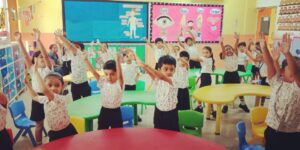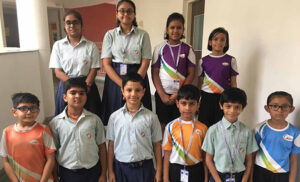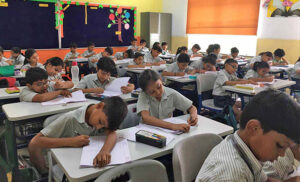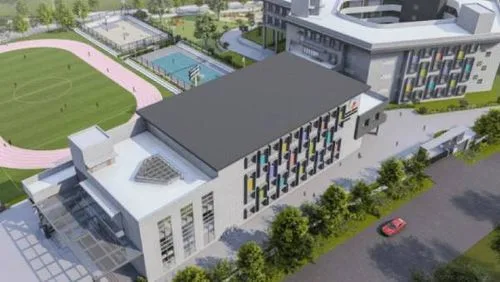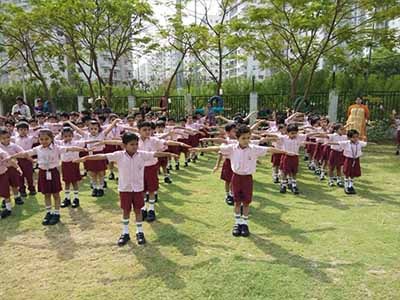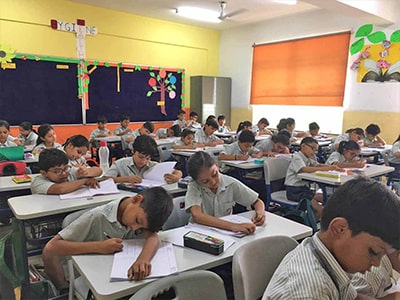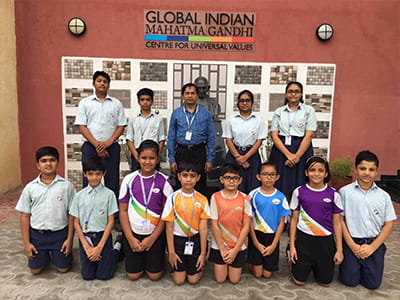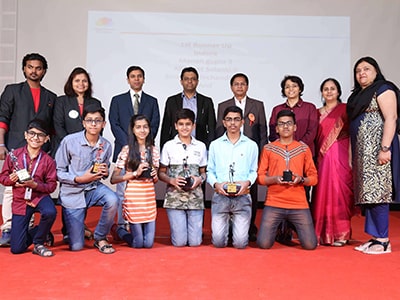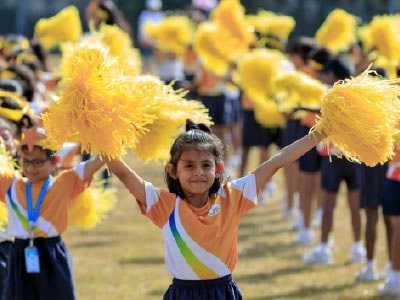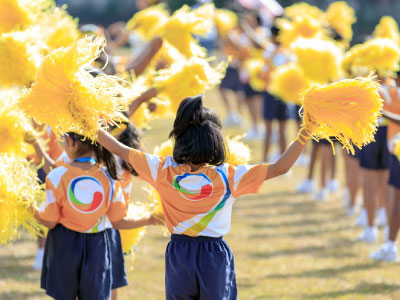Download our FREE Academic Calendar now! 📚 Start your child’s journey to success.
The year 2021-22 has been a roller coaster academic year for students all over the world. The pandemic halted everything, including education, with schools and colleges having been closed since March. While they made efforts to facilitate online learning, many basic problems became apparent, such as the lack of internet availability or adequate network, making it hard for most students to keep up with their coursework. As a result, the CBSE board cut the course by 30 per cent for this year only. Moreover, several changes were made to the CBSE curriculum in 2021-22.
What is the Central Board of Secondary Education curriculum?
The CBSE is a standardised national curriculum offered in over 24 countries worldwide, managed by India’s Central government. At present, more than 17000 schools are globally affiliated with the CBSE board, with a majority of these schools located in India. The curriculum caters to both private and public schools, following the NCERT curriculum stipulated by the National Council of Educational Research and Training (NCERT). The schools affiliated to the CBSE board use a holistic approach to learning, covering all possible knowledge areas needed for students from different classes. The NCERT curriculum offered in these schools adapts learning to a child’s age and IQ level.
Features of the Curriculum
While most curriculums are designed to offer the best education to students, they each have their way of doing so. Here are some salient features of the CBSE curriculum:
● The CBSE curriculum is a very structured and controlled curriculum aimed at offering holistic learning to learners. Standard NCERT books are used across all classes.
● No learner can fail a class until the 8th class.
● The board did away with the 10th class board exams, but these have been reinstated. The board exams are mandatory for 12th class students.
● At the secondary school level, the learning is focused on seven major areas, and schools follow the syllabus prescribed by NCERT.
● The curriculum is favoured more by engineering and medicine aspirants.
Here are the latest changes made to the curriculum in 2021-22
1. Reduced syllabus focused on learning outcomes
The board stated that the curriculum and syllabus changes were caused by the loss of classroom teaching time because of the pandemic. The syllabus was revised and rationalised to the furthest extent possible while maintaining the core concepts to achieve the intended learning level. The 30 per cent syllabus reduction is applicable only for classes 9 to 12. For elementary classes, schools can follow the alternative academic calendar and learning outcomes specified by NCERT.
The changes made by CBSE are temporary, meaning the syllabus reduction only applies to the 2021-2022 board exams. Therefore, less stress is placed on learners as they prepare for their board exams under the prevailing pandemic situation and prevent learning gaps. The sample papers released by the CBSE are also based on the revised syllabus.
After careful analysis and review, the CBSE deleted some topics and chapters from subject syllabuses to help students keep up with their course work. For instance, in class 10th Mathematics under number systems, they deleted topics such as the Euclid division lemma, cross multiplication of linear equations, and some quadratic equations.
The board also deleted topics such as learning how to prove some theorems such as Pythagoras’ theorem, trigonometry ratios, finding the area of a frustum, step deviation, and learning about the cumulative frequency graph. In Science, CBSE deleted topics such as basic metallurgical processes, carbon and its compounds, coordination and control in animals and plants, magnetism and electric current, and sources of energy, as well as some practicals such as determining the pH levels of different liquids.
In Social Science, the board removed the making of global history, the age of industrialization, forest and wildlife, water resources, mineral and energy resources, democracy and diversity, gender, religion and caste, challenges to democracy, and popular struggles and movements.
CBSE made changes to both core and elective subjects for grade 12. For instance, in English core, various reading topics such as note making and summarising, flamingo, vistas, and a few in writing such as poster making and letter writing were deleted. In English elective, the following sections were removed from Literature:
● Tomorrow and One cm (Short Story)
● Blood (Poetry)
● Science Fiction and Argumentative Indian (Non-fiction)
● Broken Images (Drama)
2. Uniform assessment
As per the CCE assessment pattern followed by CBSE, 60 percent of a learner’s assessment was based on how they performed on pen and paper exams while teachers carried out the rest in a continuous evaluation of the learner throughout the year.
However, the proposed uniform assessment pattern will increase the weightage of the pen and paper assessments to 90 per cent. Grade 6 to 8 will follow a uniform assessment system comprising two semesters with half-yearly and annual exams in these new format classes. Each semester, learners will be assessed through formative assessments and a summative assessment will be held at the end.
Learners in these classes will take annual exams based on the syllabus taught in the second semester and a certain percentage of the first-semester syllabus.
● Ten percent of the half-yearly syllabus will feature in the annual exams for class 6.
● However, class 7 and 8 will have 20 and 30 per cent, respectively.
● For 9th class, the exam and report cards will be similar to class 10.
● Schools in the upper primary classes will be required to follow the NCERT syllabus.
Grading for academic and co-curricular activities will be carried out separately, and learners will be graded on a three-point scale for extracurriculars. Factors affecting their grading include participation, regularity, teamwork, and output. Learners might also receive marks for the submission of notebooks,.
3. Revision of curriculum framework by NCERT
In response to the learning challenges caused by the pandemic, the ministry of education has also revised the National Curriculum Framework (NCF) to create a new curriculum for schools by March 2021. It will help deal with the coverage of deleted topics. The NCERT has been mandated to redesign textbooks, ensuring that nothing but the core content is placed in books. After a lot of review and deliberation, it was concluded that the cognitive load in textbooks is too high. They also lacked integration of other important learning areas such as creative thinking, life skills, art, and Indian ethos. This will be the fifth revision of the framework since its inception, and it will be in sync with the implementation of proposed CBSE examination and assessment reforms such as uniform assessment and evaluation system.
The board has also continued the period for depositing examination fees for 10th and 12th class. In previous years, the deadline was October 31; however, in light of the pandemic’s economic hardships, the board granted parents and schools an extension.
The new revisions in CBSE curriculum for 2021 is yet to be announced. However, with the prevailing situation across the globe, you can expect a few more changes in the curriculum. The implementation of NCF by March 2021 is also something to watch out for.
Given how popular CBSE is, it’s no surprise that most of the changes come as a surprise to parents and educators alike. Some protested over the exclusion of important topics such as democracy, gender, and religion. However, you can be rest assured that they have not been completely eliminated from the curriculum. These unprecedented times call for creativity and innovation to help learners regain lost time and prevent having gaps in their school lives.






